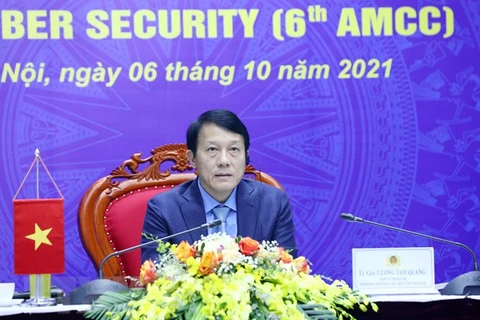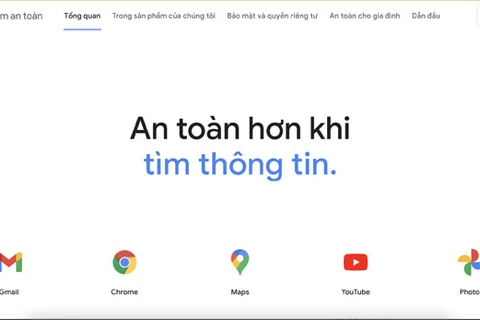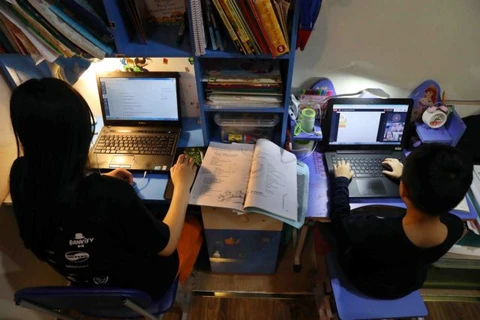Hanoi (VNA) – As children take a lot of online lessons due to the COVID-19 pandemic, they are vulnerable to exposure to numerous risks such as violent content, bullying and fake news. Therefore, teaching children how to use the Internet safely is now more imperative than ever.
Teach children to protect themselves
Every day before going to work, Nguyen Anh, who resides in Hanoi’s Hoang Mai district, does not forget to tell her daughter – a fifth grader – that she is only allowed to use the Zoom app to study and the Zalo app to share information with teachers and students. She isn’t permitted to access any website without parental consent.
At work, Anh occasionally turns on surveillance camera software to see how her daughter is studying.
"I am very worried because my daughter is still too young, and not aware of the complex issues of the Internet. On the one hand, we always provide guidance to her, but on the other hand, we still have to supervise for a while to see that she is conscientious," she said.
A survey conducted by Nielsen on children in four Southeast Asian countries, including Vietnam, found that teenagers who are online for study and entertainment are at risk of exposure to such things as violent content, cyberbullying, fake news and threats from strangers. However, children tend to be less willing to share with their parents when encountering these problems, and often choose to remain silent or take negative actions.
Meanwhile, an online parent survey questionnaire in Vietnam conducted by Qaltrics and Google shows that 71 percent of parents with young children taking online classes during the COVID-19 pandemic have concerns about online safety issues. However, more than a third of the parents interviewed had never talked to their children about internet security.
"The potential risks in real life for children such as being bullied, abducted or abused are also the same as in cyberspace. Our job is not simply to protect children from the risks, but to equip them with the knowledge and skills to be aware of threats and protect themselves, especially in the context of schools being temporarily closed due to the COVID-19 pandemic,” said Nguyen Hoang Anh, a representative of the Centre for Consultancy on Family Health and Community Development (CFC).
With the desire to equip children with the necessary knowledge and tools for children to develop safely and healthily in the online environment, the Safer with Google project for 7-13 years old children was launched in Vietnam on October 11.
The project aims to raise public awareness about internet safety for children and to equip parents and teachers with the necessary knowledge to accompany their children in the digital age. This will be done through the Be Internet Awesome course and the Interland game.
Essential skills of digital citizens
According to a Google representative, Be Internet Awesome is a free, open-ended curriculum that provides a fun, child-appropriate learning experience that focuses on five key themes of digital safety and citizenship. The curriculum is not only designed to teach kids what they need to know to become safe, fearless explorers of the online world, but also seeks to empower educators and parents to teach children good online habits.
Google cooperates with the CFC to implement the project in Vietnam. The CFC will assist in training the programme's resource trainers and popularising the programme to schools, parents, and students. Interland is an online game. It is a digital safety adventure that makes acquiring and practising knowledge more interesting.
Nguyen Thuy Uyen Phuong, founder of the Tomato Kids education system, said she highly appreciated the Safer with Google project not only for teaching internet safety skills for children, but also for providing the profound values of a responsible citizen in the digital world. These include behaving kindly with each other, bravely speaking up about danger, and protecting those who are bullied on the Internet.
Tram Nguyen, Country Director for Vietnam, Laos, and Cambodia at Google Asia Pacific, said they don’t only create useful and safe products but also support users, especially young children, to be aware of dangers and gain sufficient knowledge and means to protect themselves in cyberspace.
Nguyen Duc Tuan, Director of the Vietnam Cybersecurity Emergency Response Centre under the Authority of Information Security, said that Google is a popular platform used by many people, including children in Vietnam. Thus, he believed that the initiative would contribute to the effective implementation of the online child protection programme issued by the Prime Minister. This clearly demonstrates Google's active role and responsibility in protecting Vietnamese children./.

























